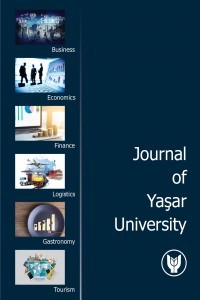
Journal of Yaşar University
Yazarlar: Mine OVACIK
Konular:Sosyal
DOI:10.19168/jyu.40119
Anahtar Kelimeler:Responsible Design,Design Activism,Socially Responsible Education,Design Education,Ethics,Slow Design,Eco
Özet: Design is a discipline mostly producing for consumer culture; basically, commercial considerations have driven design since the Industrial Revolution. Responsible Design came to prominence in the late 19th and early 20th century because design was demand-based (and judged) on economic success. Since the second half of the 20th century, it has considered not only economical consequences, but also social, political, ecological and ethical consequences. Parallel to this, design education in undergraduate level is commonly preparing designer-candidates for commercial, business world, rooted from economic-based understanding. Academic studies and graduate programs in design have independent approaches, such as “Responsible Design” has been finding a habitat in which to flourish within design education since 90’s, and is still growing. The main purpose of this paper is to contribute Socially Responsible Education by applying Responsible Design, which has deeper place in design education, rooted from individually, socially well-being and ecological-based understanding. It will be presented the context of a graduate course titled “Responsible Design 1” (RD1) led by the author in the Art and Design Graduate Program at Yaşar University in Izmir, Turkey (Fall, 2013) as a case study for supporting the purpose. The context and outcomes of this course contains both theoretical and practical experience by an academic infrastructure with social, ecological, ethical issues and sustainability among art and design graduate students, via Design Acts or Design Activism. The value here is challenging experiences in the process of gaining knowledge and awareness through practical applications in the discipline. Conducting projects generated from responsible thinking and how to convert this approach into practice-based outcomes to spread awareness by responsible design is the main research question here. The approach of the course is to search for “how to gain knowledge to conceptualize and materialize ideas in responsible design acts?” Based on this question, in seven weeks, the theoretical issues such as; responsibilities in design, ethics, environmental design, slow design, life span of products, ecology and politics, human-centered design were studied. National and international activist projects on service, system design were reviewed. TED Talks and speeches were reviewed; and relating documentaries were watched. In following 7-week, a practical implication completed: Students created “Six Activist Projects” in subjects of their research interest. These met with audience in an exhibition, held at the campus of Yaşar University at the end of the semester. Briefly, the program of the course was enriched by various visual sources, interrelating design discourses alive-study cases and eventually learning-by-doing method. The complexity and challenges of responsible design acts and/or design activism in education will be argued in this paper. By observing the design concepts, processes and outcomes of the six projects, it revealed that the development of responsible design acts is basically simple, which sparks further practice-based design research. The impact of the course on the students’ further studies will be also shared briefly. The results of RD1 have a potential to discuss about how to develop further responsible design-acts in education to create deeper social and ecological impacts by design. Finally, an idea of “Slowing down design education” rooted from Slow Schooling in Slow Movement by Honoré (2009) - will be suggested